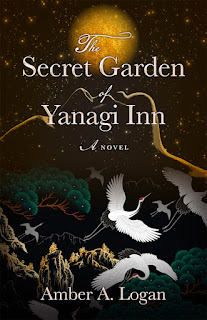A beautifully written opening chapter draws us into Amber Logan's world of Marissa Lennox - a world I’m not sure that we'd want to enter. Still grieving her mother’s death, the pain almost unbearable, Mari Lennox travels half way across the globe to Kyoto, Japan to take photographs of Yanagi Inn for a client. As she wanders about the inn and its grounds, her camera captures unusually fascinating images, which seem to uncover layers of mystery that envelope the old resort, the most enticing, overgrown, secret garden on a forbidden island.
But then eerie weeping starts to keep Marissa awake at night. The only problem is that no one else in the inn seems to hear the sounds. Mari searches the old building, despite the warnings of the staff, to find the source of the spectral sobbing, only to discover that her own family’s history is intertwined with that of the inn, its mystical abandoned garden and the frightening enigma it shrouds.
Beautifully written and wonderfully illustrated, I recommend this to all who want to have company on a dark night as the wind and the rain sweeps against their window. At least I hope it is the rain.
Jon Wilkins is 66. He is married to the gorgeous Annie with two wonderful sons. He was a teacher for twenty years, a Waterstones bookseller and coached women’s basketball for over thirty years before taking up writing seriously. Nowadays he takes notes for students with Special Needs at Leicester University. He has had a work commissioned by the UK Arts Council and several pieces published traditionally as well as on-line. He has had poems in magazines and anthologies, art galleries, studios, museums and at Huddersfield Railway Station. He loves writing poetry. For his MA, he wrote a crime novel, Utrecht Snow. He followed it up with Utrecht Rain, and is now writing a third part. He is currently writing a crime series, Poppy Knows Best, set at the end of the Great War and into the early 1920s.


No comments:
Post a Comment